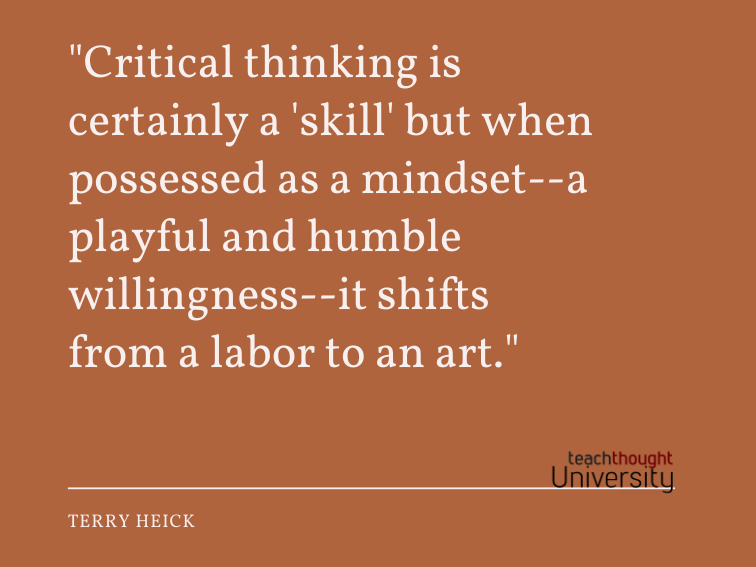

by Terry Heick
Every few months, I see a post making the rounds that crucial reasoning isn’t a skill and consequently can’t be shown.
And since it’s also hard to determine and contemporary public education is driven by measurement, as an idea it type of sits in the edge, unconcerned and mute.
Often, these articles remain in regards to a discussion or research related to Daniel Willingham, a psychologist at the College of Virginia that is typically associated with this type of claim. Despite the fact that my impulse is to differ, Willingham, naturally, knows much more regarding this subject than I do so my objective right here is not to dispute that declare.
I do, nonetheless, assume it’s feasible that we may misinterpret what it indicates to think critically, which I’ve covered (though rarely or well enough) lot of times. In The Definition Of Critical Thinking , for example, I claimed:
Vital thinking is among the very first causes for modification (personal and social) but is a pariah in colleges– for no other reason than it conditions the mind to suspect the type and function of every little thing it sees, including your classroom and whatever being shown in it. Of course, critical thinking without expertise is embarrassingly still, like a farmer without a field. They require each other– idea and expertise. They can likewise go away right into one another as they work. When we have actually established that– that they’re separate, with the ability of combining, and need one another– we can get at the marrow and anxiety of this whole point.
Terry Heick
After watching the impact of disinformation on recent nationwide and worldwide events, it has occurred to me that vital thinking is much less of an ability and even more of a determination or habit. Basically, important thinking is a frame of mind. As I have actually said before concerning analysis– right here, for example, in Why Pupils Need To Read — is that while it is very important that pupils can read, it’s more important that they do read.
And crucial thinking– assuming rationally, with reason and evidence, humbleness and knowledge, understanding and uncertainty– is comparable: it is essential that trainees can believe critically but it’s more crucial that they do assume seriously.
In this way, critical thinking needs to be an attitude.
Crucial Thinking Is A Mindset
Arstechnica (rather) lately blogged about how fixed frame of minds hurt assuming in going over Why Can Only 24 % Solve Bayesian Reasoning Problems in All-natural Regularities: Frequency Fear even with Likelihood Loss Of Sight
Equally as math can be said to be a type of language and science is a mindset, important reasoning (while additionally being a ‘way’ of reasoning) is first a mindset– a readiness to do so both came before and proceeded by a motley collection of presuppositions and premises and propensities and cognitive defaults and even at some point personality traits that manifest when you review a publication or have a conversation or skim an information heading or research a concept.
Critical reasoning is certainly a ‘ability’ but when possessed as a mindset– a playful and humble determination– it shifts from a labor to an art. It asks, ‘Is this true? By what standard? That would certainly disagree and why? What is the background of this problem or subject? What am I missing? What sort of understanding am I missing out on to understand this much more very closely and how can I acquire them?
Vital reasoning as a skill attempts to understand.
Essential reasoning as a frame of mind reads and listens as a witness and is haunted by what it doesn’t recognize and can not recognize and after that, from that starting factor, begins the procedure of reason– of being and becoming logical
Essential thinking isn’t psychological due to the fact that its identity isn’t wrapped up in a viewpoint or ‘idea’ and being ‘incorrect’ is beneficial due to the fact that it obtains us closer to being ‘right.’
Essential thinking is virtually impossible to apply without some kind of predisposition yet, as an attitude, it watches for its very own prejudices (see the interpretation verification bias , for example) as a security guard might expect complete strangers.
Important reasoning is sluggish to make a decision and might not ‘make a decision’ whatsoever because it realizes that in the face of brand-new evidence, it has to think again. And once more. And once more.
And, as a state of mind, it’s all right with the labor of all of it since it values reason more than favor with crowds; it prefers precision over viewed accuracy and encounters any kind of circumstance wide-eyed and humble and interested, seeking to understand and frightened to death of prejudice and insufficient knowledge and logical fallacies and other cognitive misbehaviors that could lead it astray.
See? Essential reasoning is an ability however it’s also a propensity and trait and light-making tool in darkness for several becomes an attitude– both a way of recognizing and a way of being.
And this is all component of means training it as a skill– similar to teach pupils how to check out instead of why– belongs to our difficulty in education and learning. As usual, we are asking the wrong concerns.
Essential Believing Is A Way of thinking